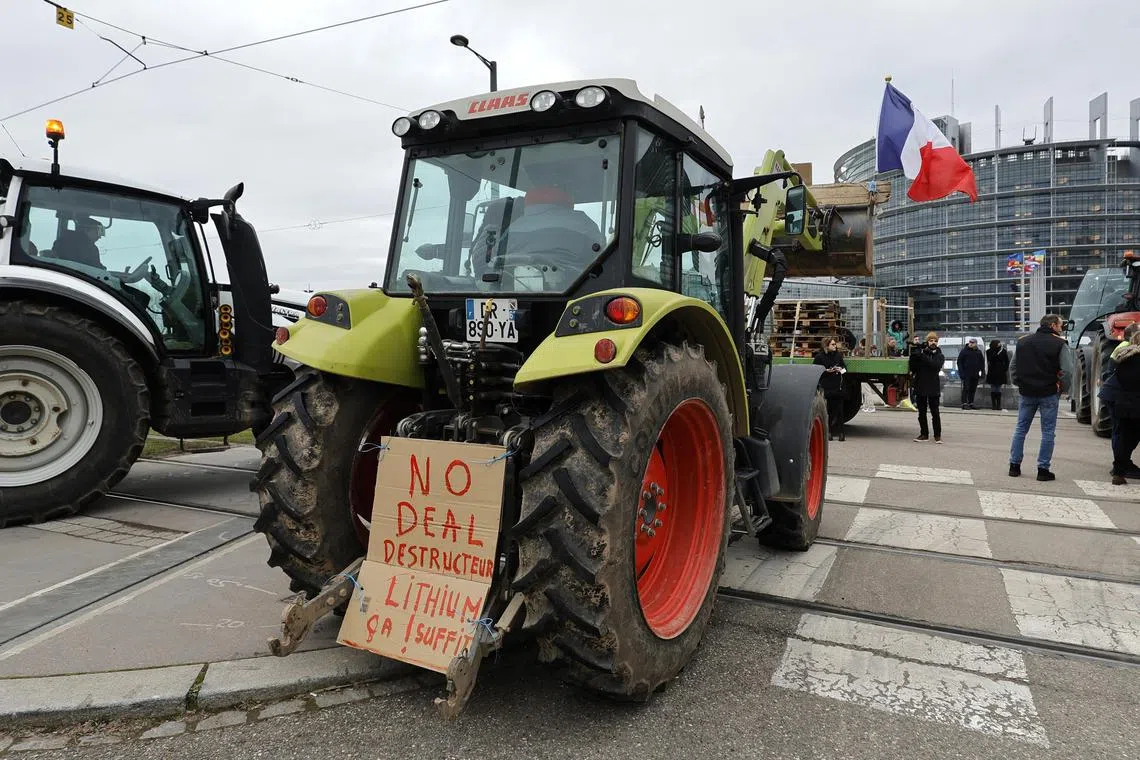EU withdraws push to cut pesticide use after farmer protests
Sign up now: Get ST's newsletters delivered to your inbox

Farmers across Europe have argued against proposed EU regulations, plans to cut subsidies and free trade deals with countries outside the bloc.
PHOTO: EPA-EFE
BRUSSELS – European Commission president Ursula von der Leyen said on Feb 6 she will withdraw a plan to halve the use of pesticides because it became a “symbol of polarisation” following protests by farmers across Europe.
The European Union’s executive arm in June 2022 proposed a regulation to slash pesticide use by 50 per cent until 2030 as part of a plan to make farming more sustainable, but the European Parliament voted it down.
Fears over falling crop yields and doubts over the ability of farmers to find substitutes and meet targets outweighed concerns about the environmental impact of pesticides.
“Only if we achieve our climate and environmental goals together, will farmers be able to continue to make a living,” Dr von der Leyen said on Feb 6 during a European Parliament debate in Strasbourg.
The decision followed a wave of protests in France, Belgium and across Europe.
Farmers have argued against proposed EU regulations, plans to cut subsidies and free trade deals with countries outside the bloc.
The French government had to promise farmers more financial support and a crackdown on unfair competition, as well as tougher checks on the origin of products for them to suspend further blockades. Last week, the EU delayed plans requiring farmers to reserve more of their land fallow to improve biodiversity.
The bloc’s executive finds itself in a balancing act as it rolls out an ambitious climate roadmap on Feb 6 to pursue a 90 per cent net emissions reduction by 2040 that will require more sustainable consumer lifestyles and restrictions on businesses and agriculture.
The move to withdraw the pesticides plan is another example of the EU backtracking on legislation aimed at greening the bloc’s economy.
The EU had to settle for a watered-down deal on a nature restoration law to return at least 20 per cent of the bloc’s land and sea back to its original state.
The announcement on pesticides demonstrates the commission’s response to criticism as the EU is heading towards elections in June.
In January, Dr von der Leyen kicked off a strategic dialogue with the agricultural sector in an effort to placate farmers and show appreciation and respect.
Belgian Prime Minister Alexander De Croo, who during the protests had seen Brussels streets blocked and public monuments vandalised, welcomed the decision.
“Crucial we keep our farmers on board,” Mr De Croo wrote in a post on social media platform X.
In time, a new, more mature proposal on pesticides with more stakeholder involvement may be put forward, Dr von der Leyen told the lawmakers, insisting that the discussion over reduced the use of the chemicals will continue. BLOOMBERG


